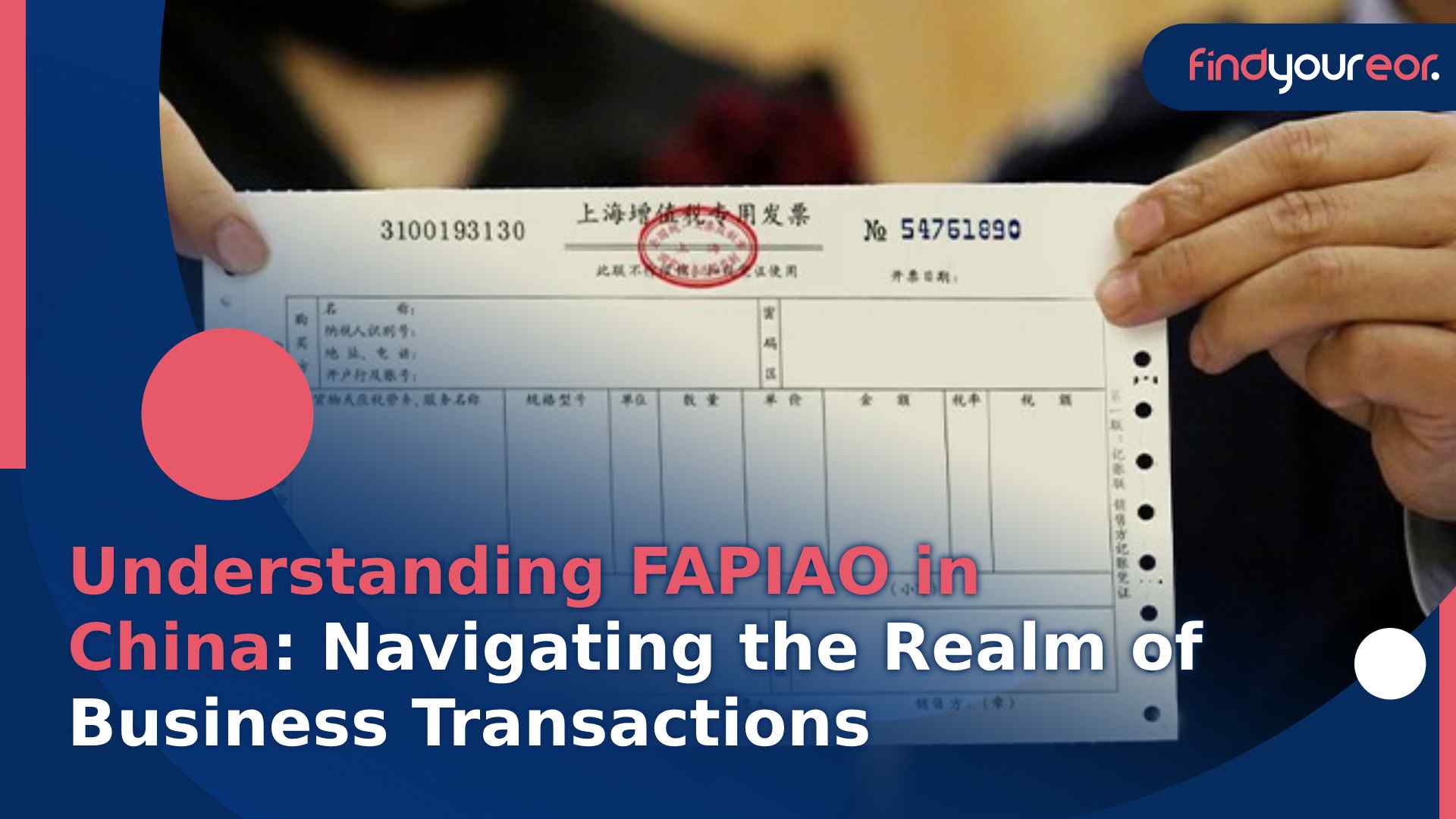Understanding FAPIAO in China: Navigating the Realm of Business Transactions
Last update: November 11th 2023
In the intricate landscape of Chinese business transactions, FAPIAO stands as a crucial element, shaping the financial interactions within the nation. In other words, FAPIAO is more than a mere document; it embodies the essence of compliance, transparency, and legal integrity in the business world of China.
In this article, you will find all the information about FAPIAO China. Read on!
What is a FAPIAO in China?
Firstly, what is FAPIAO number? FAPIAO, a term rooted in Chinese fiscal regulations, represents an official invoice essential for businesses operating within the country. Consequently, FAPIAO is more than a financial record; it is a tangible proof of a legal transaction, detailing the goods or services exchanged and the applicable taxes.
In other words, it is a cornerstone of financial accountability in the Chinese commercial landscape. Also, in Chinese business terminology, FAPIAO (发票) translates to an official invoice or receipt issued by the State Administration of Taxation in the People's Republic of China. In simpler terms, it represents a legal document that verifies a commercial transaction, providing a detailed account of the goods or services exchanged, along with the applicable taxes.
What is FAPIAO number?
The FAPIAO meaning essentially encapsulates the legal and financial essence of an official invoice. In essence, it serves as a vital financial record, ensuring businesses comply with tax regulations and maintain transparency in their transactions. Therefore, a FAPIAO is more than just a piece of paper; it is a testament to the legitimacy of a business exchange.
5 reasons for companies to use FAPIAO
The utilization of FAPIAO is not merely a choice but an imperative. Consequently, businesses must recognize the multitude of reasons why integrating FAPIAO into their financial practices is crucial for seamless operations, legal adherence, and trust-building with stakeholders.
1. Legal Compliance
To begin with, businesses in China are legally mandated to issue FAPIAO for all transactions. Therefore, compliance with this regulation ensures that businesses operate within the bounds of the law, mitigating legal risks and potential fines.
2. Tax Regulation Adherence
Furthermore, FAPIAO issuance aligns businesses with tax regulations. As a result, accurate documentation of transactions aids in precise tax reporting, reducing the likelihood of tax-related discrepancies and audits. Consequently, businesses maintain their fiscal integrity.
3. Transparent Financial Transactions
The issuance of FAPIAO fosters transparency in financial dealings. In other words, transparent transactions enhance stakeholders' confidence by providing a clear account of expenditures and revenues. Additionally, this transparency minimizes misunderstandings and disputes, reinforcing trust between parties involved.
4. Credibility and Trustworthiness
Businesses utilizing FAPIAO demonstrate credibility and trustworthiness to clients, partners, and investors. In essence, these official invoices serve as tangible proof of transactions, validating the authenticity of business operations. Therefore, stakeholders trust businesses that provide verifiable and legitimate financial records.
5. Building Client Confidence
The provision of FAPIAO enhances client confidence in the business relationship. Consequently, clients feel secure knowing that their transactions are documented and verifiable. Additionally, this confidence often leads to repeat business, referrals, and long-term partnerships.
Who Is Responsible for Administering FAPIAO?
The administration of FAPIAO falls under the jurisdiction of China's State Administration of Taxation (SAT). In other words, SAT oversees the issuance, distribution, and regulation of FAPIAO, ensuring standardization and adherence to fiscal guidelines. As a result, businesses collaborate with SAT to maintain compliance and uphold the integrity of their financial transactions.
Requirements to Issue FAPIAO: The Criteria for Financial Transparency
Understanding the intricate requirements to issue FAPIAO is fundamental for businesses aiming to maintain financial transparency and legal integrity. Therefore, businesses must acquaint themselves with the stringent criteria mandated by Chinese tax authorities to ensure accurate issuance and compliance with tax regulations.
Registered Business Entity
First and foremost, businesses must be registered entities within China. In other words, only legally recognized businesses are eligible to issue FAPIAO. Consequently, this requirement establishes a foundation of legitimacy, ensuring that transactions are conducted by authorized entities.
Taxpayer Identification Number (TIN)
Issuing FAPIAO necessitates a valid Taxpayer Identification Number (TIN). Therefore, businesses must acquire this unique identifier from the Chinese tax authorities. As a result, the TIN serves as a distinctive marker, linking FAPIAO to specific taxpayers, aiding in accurate record-keeping and tracking of transactions.
Accurate Transaction Details
When issuing FAPIAO, businesses must provide precise details of the transaction. In essence, this includes a comprehensive description of the goods or services exchanged, their quantities, unit prices, and total amounts. In other words, meticulous accuracy is paramount to prevent discrepancies and ensure the FAPIAO's authenticity.
Compliance with Tax Categories
Transactions must adhere to the appropriate tax categories. Consequently, businesses must categorize their goods or services correctly, ensuring they fall under the applicable tax rates. In other words, misclassification can lead to tax-related issues, emphasizing the importance of accurate categorization.
Verification of Supporting Documents
Supporting documents, such as invoices from suppliers, must be verified and match the transaction details on the FAPIAO. In simpler terms, businesses must maintain a coherent paper trail, ensuring that each transaction aligns with the documented evidence. Therefore, this verification process adds an extra layer of authenticity and compliance.
Document Storage and Retrieval
Businesses are required to store FAPIAO and related documents for a specific period. This storage period, typically several years, allows for future audits and verifications. In essence, meticulous record-keeping practices are essential, ensuring swift retrieval of documents when required, maintaining compliance with regulatory obligations.
Timely Issuance and Distribution
FAPIAO must be issued promptly after a transaction. Therefore, businesses must adhere to strict timelines to ensure the timely provision of these official invoices to clients and partners. Consequently, punctuality in FAPIAO issuance demonstrates a commitment to compliance and fosters transparent business relationships.
Continuous Compliance Monitoring
Businesses must continuously monitor their compliance with FAPIAO regulations. In other words, periodic internal audits and reviews are essential to identify and rectify any discrepancies or potential issues promptly. Consequently, proactive compliance monitoring mitigates risks and ensures ongoing adherence to regulatory standards.
FAPIAO Number Accuracy
Each FAPIAO must be assigned a unique FAPIAO number. Therefore, businesses must accurately generate and assign these numbers, ensuring that no two invoices bear the same identifier. In essence, FAPIAO numbers serve as a fundamental component of traceability, reinforcing the authenticity of transactions.
Employee Training and Awareness
Ensuring employees are well-trained and aware of FAPIAO issuance requirements is vital. Consequently, businesses must invest in training programs to educate staff about the proper procedures, documentation, and compliance standards. In other words, well-informed employees reduce the likelihood of errors and enhance overall compliance.
Understanding FAPIAO Categories in China
FAPIAO comes in two distinct categories, each serving specific purposes:
· Special Value-Added Tax FAPIAO. Special Value-Added Tax FAPIAO is utilized for tax deduction purposes. This type of FAPIAO includes comprehensive information, such as the company’s tax code, address, telephone number, and bank account details. In essence, it provides a detailed breakdown of the transaction, distinguishing between taxable and non-taxable figures. This meticulous information is vital for businesses aiming to claim tax deductions accurately.
· General FAPIAO. On the other hand, General FAPIAO is not intended for tax-deduction purposes. Unlike Special Value-Added Tax FAPIAO, the purchase amount on general FAPIAO is not typically broken down into different categories. Businesses resort to general FAPIAO transactions when they are unable to engage in a special VAT FAPIAO transaction due to various reasons.
Given the intricacies involved, businesses are advised to consult their accountants. This consultation ensures that businesses request the appropriate type of FAPIAO when making payments for goods and services. Understanding these distinctions is essential for businesses to maintain financial accuracy and adhere to tax regulations in the dynamic landscape of Chinese commerce.
Possible Problems or Challenges with FAPIAO in Chinese Business Transactions
In the realm of Chinese business transactions, while FAPIAO is an indispensable tool for financial transparency, it is not without its challenges. Businesses must be aware of these potential issues to ensure seamless operations and compliance with regulatory standards. Here are some of the possible problems or challenges associated with FAPIAO:
Documentation Errors
One common challenge businesses face is documentation errors on FAPIAO. These errors can range from incorrect transaction details to misspelled names, leading to discrepancies and potential issues during audits. Businesses must maintain vigilance to minimize such inaccuracies.
Delayed Issuance
Delayed issuance of FAPIAO can occur due to various reasons, such as administrative bottlenecks or procedural complexities. Delays can disrupt the financial record-keeping process, leading to challenges in accurate accounting and taxation. Businesses must proactively address these delays to maintain compliance.
Non-Compliance Penalties
Failure to issue or report FAPIAO accurately can lead to severe penalties and legal consequences. Businesses may face fines and other punitive measures if they do not adhere to the regulations. Ensuring compliance is crucial to avoiding these penalties and maintaining the company's financial stability.
Complex Tax Codes
Navigating the intricate tax codes associated with different types of FAPIAO can be daunting. Businesses must understand the nuances of tax regulations to categorize transactions correctly. Misclassification can lead to tax-related challenges and hinder smooth financial operations.
Evolving Regulations
Chinese tax regulations are subject to changes and updates. Keeping up with these evolving regulations is essential to ensure that businesses adhere to the latest standards. Failure to comply with updated regulations can result in non-compliance issues and financial complications.
Non-Standardized Processes
In some cases, businesses may encounter non-standardized FAPIAO issuance processes across regions or sectors. Non-standardization can lead to inconsistencies in documentation, making it challenging to maintain uniform financial records. Businesses must adapt to these variations to uphold accuracy.
Fraud and Counterfeiting
Counterfeit or fraudulent FAPIAO can pose significant challenges. Businesses must be vigilant to detect fake invoices that might be used for illegal purposes. Verifying the authenticity of FAPIAO and implementing stringent internal controls are essential to mitigate fraud risks.
Language and Cultural Barriers
For international businesses operating in China, language and cultural differences can complicate FAPIAO-related processes. Effective communication and understanding of local practices are essential to overcome language barriers and ensure accurate FAPIAO documentation.
Integration with Digital Systems
As businesses transition to digital systems, integrating FAPIAO into digital platforms can be complex. Ensuring seamless integration is crucial to maintain accurate financial records while embracing technological advancements. Businesses must invest in compatible digital solutions.
Staff Training and Awareness
Insufficient training and awareness among staff regarding FAPIAO regulations and procedures can lead to errors. Comprehensive training programs are necessary to educate employees about FAPIAO requirements and foster a culture of compliance within the organization.
Why Consumers Seek FAPIAO: Understanding the Motivations
Consumers often have specific motivations for requesting FAPIAO in various transactions. One primary reason is the requirement imposed by their accounting department. When employees incur expenses, such as during business luncheons or supply purchases, the accounting department mandates FAPIAO usage. This insistence stems from the department's need to categorize the transaction as a taxable deduction, ensuring accurate financial records.
Additionally, workers may be obligated to submit a designated number of FAPIAO each month. Meeting this quota not only fulfills organizational requirements but also yields tangible benefits. Submitting more FAPIAO can lead to a reduction in the worker's taxable salary. As a result, individuals are incentivized to utilize FAPIAO diligently, aligning with both organizational policies and personal financial interests.
Obtaining FAPIAO: The Process Unveiled
Securing FAPIAO involves a structured process initiated by businesses. First, a business submits a maximum invoice amount application, aiming to register for FAPIAO and establish its status. Applications surpassing transactions exceeding RMB 100,000 prompt a site inspection for the applicant. Specific quotas regulate the number of FAPIAO that can be printed and their capital value, determined by the local tax bureau. These quotas directly relate to the business's manufacturing or operational status, dictating their FAPIAO allowance.
Upon approval of special VAT invoice quotas by the tax bureau, businesses can print invoices using specialized computers provided by the tax bureau. These printers seamlessly integrate into the Chinese tax system, ensuring accuracy and compliance. To operate these printers effectively, one or more representatives from the company may undergo training at the local tax bureau, enhancing their proficiency in FAPIAO management.
In cases where businesses exceed the allocated quota, they have two options. They can either request a temporary value increase to accommodate their immediate needs or apply for additional FAPIAO, ensuring uninterrupted financial operations within the prescribed regulatory limits.
In conclusion, FAPIAO stands as a cornerstone of financial transparency and compliance in China. Therefore, businesses must navigate the complexities of FAPIAO issuance with diligence and precision.


















.jpg)




















